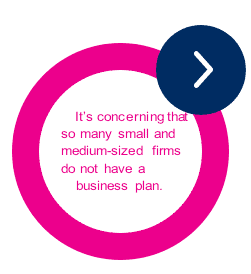
Most business owners know that without a comprehensive, up-to-date business plan and an implementation timetable, they may be missing out on opportunities for growth and not realising their full potential. However, around 30% of SMEs don’t have one. To ensure you’re ahead of your competitors, it’s imperative to find the time and/or resources to create and implement a plan for the start of the new financial year.
A formal plan can be an extremely valuable tool for managing and growing a business. It allows a company to recognize its strengths and weaknesses. Furthermore, research has shown that SMEs that have a business plan in place are consistently more profitable than those who don’t.
A Formal Plan
Planning is the key to the success of any business, no matter its size or age. Yet many SMEs don’t have a plan. The majority of those without such a plan say they don’t believe it’s necessary or that they keep their plans in their head.
It’s concerning that so many small and medium-sized businesses don’t have a formal business plan. Without clear direction, they may be missing out on opportunities for growth and not realizing their full potential. A plan is invaluable and should see out the company’s:
- Strategic direction
- Main operating and financial targets;
- Actions it will take to achieve those targets,
- New initiatives and investments planned;
- And their impact on the company’s performance

Creation and Implementation
Creating a well thought-through, comprehensive business plan is an arduous task. Thinking through objectives and likely outcomes which may occur many years down the line is challenging. But it is the hard work up front which makes for lighter work down the road as all of our team of part-time CFOs will attest to.
Most CEOs and business owners simply don’t have the time to spend on quality strategic thinking or to document and communicate that thinking in a way which allows the whole business to buy into the vision.
Harder still is managing and implementing the business plan. Significant strategic course corrections are commonplace in fast-growing companies. These should be embraced. The tricky part though is in managing regular change. That requires a combination of time and specialist knowledge.
There is an art and science to effective business planning and getting it right brings a real sense of clarity and direction to business – this is where an experienced part-time CFO can make a significant contribution.
Not spending quality time on strategic planning usually leads to a chaotic working environment. Our clients often talk about ‘not feeling in control’ and ‘not really knowing what is coming around the next corner’.
Proper business planning is very liberating for the business owner, whatever their objective might be. A well-constructed and regularly reviewed business plan will instil real confidence that the goal is indeed achievable.
Key Benefits
Writing a business plan has many benefits for businesses of any size and in any industry. It can help owners and senior managers to:
- Clarify objectives and develop suitable strategies.
- Understand the market.
- Identify and overcome internal and external threats
- Organise the company
- Access external funding
Key Elements
The most important part of your business plan is its financial information. Your financial forecasts should include your cash flow predictions for the next 12 months or more. You’ll also need to include sales estimates and costs to ensure the business has enough working capital or to ensure you understand any needs to arrange additional financing.
You need to explain all assumptions in the business plan, with best and worst case scenarios. Detail the risks you’re likely to face and how they will be dealt with.
Conclusion
- An up-to-date business plan or ‘roadmap’ in your business will allow you to experience a sense of control, which may have been absent since the day you started your company.
- The business plan will remove a significant amount of confusion from your operating procedures. There will always be challenges contained within new projects but you will have a proper framework against which all decision-making can take place.
- The plan provides the blueprint for delegating responsibility to your team and allows you to create some space in your own environment to work on growing your business.
- You will move out of the chaos and into a more serene working environment where each of the gears, which make up the bigger system, is able to move in harmony.
- Potential hazards will have been identified in advance and dealt with before they become unmanageable. You will be able to move from a culture of fire-fighting to a culture of fire-prevention and the benefits will be felt by each member of your team and most probably by your customers too.
- A part-time CFO can assist with creating, implementing and reviewing your Business Plan, as well as be a constant guide and sounding board for you.
The business plan is the first key to profitable growth!
Photo by fauxels: https://www.pexels.com/photo/photo-of-people-doing-handshakes-3183197/
Hire a superstar part-time CFO
To help you increase cash, profit and valuation and free you up from the burden of day-to-day operations.
